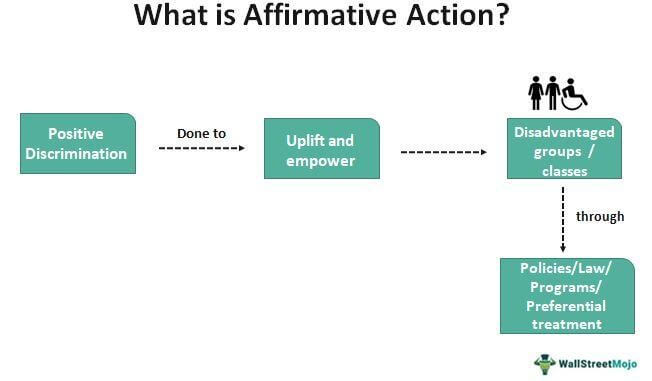The Benefits of Affirmative Action: Promoting Equality and Diversity
Affirmative action has long been a topic of debate and discussion, with proponents highlighting its potential to address historical inequalities and promote diversity, while critics argue that it can lead to reverse discrimination. In this article, we will delve into the benefits of affirmative action, exploring how it can contribute to a more equitable society and foster inclusivity in various domains.
Enhancing Equal Opportunities
Affirmative action policies are designed to level the playing field and provide individuals from marginalized groups with equal opportunities. By actively considering factors such as race, gender, or socioeconomic background, organizations can identify and address systemic disadvantages that have historically hindered the advancement of certain groups.
Through targeted recruitment and selection processes, affirmative action helps to break down barriers and create pathways for individuals who may have otherwise been overlooked. This approach not only promotes fairness but also encourages a diverse range of perspectives, experiences, and talents in various fields.
Fostering Diversity and Inclusion
Affirmative action plays a crucial role in fostering diversity and inclusion within educational institutions, workplaces, and other sectors. By actively seeking out individuals from underrepresented backgrounds, organizations can create environments that reflect the broader population they serve.
Studies have consistently shown that diverse teams and organizations are more innovative, creative, and adaptable. By bringing together individuals with different perspectives, skills, and cultural backgrounds, affirmative action helps to enhance problem-solving, decision-making, and overall organizational performance.
Addressing Systemic Inequalities
One of the key aims of affirmative action is to address systemic inequalities that have persisted throughout history. By acknowledging and actively working to rectify these disparities, society can move closer to achieving true equality.
Historically marginalized groups, such as racial minorities and women, have faced significant barriers to accessing education, employment, and other opportunities. Affirmative action seeks to dismantle these barriers by providing targeted support, scholarships, and mentorship programs, enabling individuals from underrepresented backgrounds to thrive and succeed.
Creating Role Models and Breaking Stereotypes
Affirmative action initiatives can also serve as a powerful tool for creating role models and breaking stereotypes. When individuals from underrepresented groups achieve success and recognition, they become sources of inspiration and motivation for others facing similar challenges.
By increasing the visibility of diverse individuals in leadership positions, academia, and other influential domains, affirmative action helps challenge preconceived notions and biases. This, in turn, encourages young people from underrepresented backgrounds to pursue their goals and aspirations, knowing that they too can overcome obstacles and achieve their dreams.
Building Stronger Communities
Affirmative action not only benefits individuals but also contributes to the overall strength and resilience of communities. By promoting diversity and inclusion, these policies foster social cohesion, understanding, and empathy among different groups.
When individuals from diverse backgrounds have equal access to opportunities, it creates a sense of fairness and shared purpose within society. This, in turn, can lead to reduced social tensions, increased trust, and the development of stronger, more inclusive communities.

Affirmative action, despite its controversies, offers a range of benefits that contribute to a fairer and more inclusive society. By enhancing equal opportunities, fostering diversity and inclusion, addressing systemic inequalities, creating role models, and building stronger communities, affirmative action helps to level the playing field and ensure that everyone has a chance to succeed.
It is important to recognize that affirmative action is just one piece of the puzzle in achieving true equality. Efforts should also be directed towards addressing the root causes of inequality and promoting systemic change. However, affirmative action remains a valuable tool in the ongoing fight for a more just and equitable society.
Frequently Asked Questions about Benefits of Affirmative Action
1. What is affirmative action?
Affirmative action refers to policies and practices aimed at increasing opportunities for historically disadvantaged groups, such as racial minorities and women, to promote equality in education and employment.
2. What are the main goals of affirmative action?
The main goals of affirmative action are to promote diversity, rectify past discrimination, and create equal opportunities for underrepresented groups.
3. How does affirmative action promote diversity?
Affirmative action encourages the inclusion of individuals from diverse backgrounds in educational institutions and workplaces, fostering a richer and more varied environment that benefits everyone involved.
4. Does affirmative action only benefit racial minorities?
No, affirmative action benefits various disadvantaged groups, including racial minorities, women, individuals with disabilities, and veterans, among others.
5. Does affirmative action lower standards?
No, affirmative action does not lower standards. It ensures that qualified individuals from underrepresented groups have equal access to opportunities and are evaluated fairly based on their merits.
6. How does affirmative action rectify past discrimination?
Affirmative action acknowledges historical injustices and attempts to level the playing field by providing additional opportunities and support for those who have been historically marginalized or discriminated against.
7. Does affirmative action violate the principle of meritocracy?
No, affirmative action does not undermine meritocracy. It aims to remove barriers that prevent individuals from underrepresented groups, who possess the necessary qualifications, from being considered fairly for educational and employment opportunities.
8. Does affirmative action guarantee preferential treatment?
No, affirmative action does not guarantee preferential treatment. It ensures that all individuals are considered fairly, taking into account their qualifications and the need for diversity in a given context.
9. What are the economic benefits of affirmative action?
Affirmative action can lead to a more diverse and inclusive workforce, which has been linked to increased innovation, creativity, and productivity. It also helps address income disparities by providing equal access to higher education and better employment opportunities.
10. Is affirmative action still necessary today?
Yes, affirmative action is still necessary today because systemic inequalities and discrimination persist. It helps address the ongoing effects of historical disadvantages and promotes a more equitable society.




